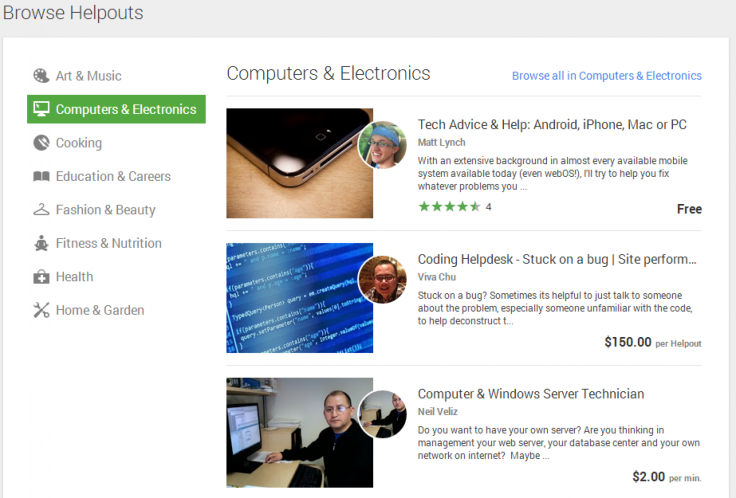Google Helpouts: 5 Ways Google Can Profit From Its New Video Streaming Tutorial Service
When people need help with something -- like a teenager learning to tie a neck tie or hipsters wanting to brew their own beer -- they are turning to video tutorials on YouTube. Google Inc. (NASDAQ: GOOG) has taken notice and combined this phenomenon with “Hangouts,” Google’s live streaming video chat service, to launch “Helpouts,” a new service to connect experts with people looking for help. Google began testing Helpouts back in August, and officially launched the service Monday.
Google said on its blog that its goal with Helpouts is simply to “help people help each other.” But like most Google services, Helpouts can open a brand new revenue stream for the Mountain View, Calif.-based search company. These are five ways Google can make money of its new Helpout service.
1. Charge Experts
While many experts can give free Helpout sessions, Google also allows experts to set a price for their help. Experts can charge per Helpout or by the minute. Some, like “Coding Helpdesk” helpout with Viva Chu, cost $150 per hang out. Most tend to be in the $10 to $30 range.

When Google was testing the service in August, it took a 20 percent cut of the paid Helpouts as a platform fee. Of course, this is just chump change for Google, but can add up if the idea of Helpouts really takes off. It should be noted, however, that Google will not charge medical professionals for health care Helpouts.
2. Charges Brands
Here’s the real money maker. Google’s primary revenue stream has always been advertising, so it shouldn’t be any surprise that Google is providing a new marketing tool for partner brands.
“You can get help from individuals or from brands you already know and trust, like Sephora, One Medical, Weight Watchers, Redbeacon (a Home Depot company), and Rosetta Stone,” Udi Manber, the vice president of engineering at Google wrote on the official Google blog. A Google spokesperson told IB Times that brands will be subject to the same 20 percent fee.
Google could promote these Helpouts in search results, similar to how advertising works in Google Maps. It will be another tool Google can add to its ever-growing portfolio of marketing services.
3. Bring More Small Businesses To Google Services
With programs like “Get American Businesses Online,” Google promotes the value of Google services to small businesses. The goal seems to get companies to start using Google Plus, Hangouts, Google Analytics and ultimately join the AdWords network. Google Helpouts will fit in nicely with this ecosystem. It will give small businesses a chance to market their expertise for free or cheap and maybe generate a few extra dollars for the company. For Google, it’s another way to get more small businesses involved in its lucrative advertising platform.
4. Capture Traffic From About.com And WikiHow
Nowadays, Google Search is usually the number one destination for people to answer a question or get help. While Google can put ads in search results and on the sidebar, users often click on websites like About.com or wikiHow which then reap the profits from that traffic. With Helpouts, Google can keep this traffic for itself, as well as the advertising revenue that the traffic generates.
5. More Users On Google Plus
Google continues to push its Google Plus social network by requiring users to sign up in order to use other services. Gmail accounts, YouTube and Hangouts (which recently incorporated Gchat) are all tied to a Google Plus platform and Helpouts are no different. In order to give or get help, users must use a Google Plus account. This, of course, provides another opportunity for Google to advertise.
Google Helpouts appears to be a service that benefits everyone involved, including users, small businesses, big companies and, of course, Google. Like many Internet services, however, it remains to be seen if users will be willing to pay for information they can likely find for free somewhere else on the Web.
Have you used Google Helpouts? What do you think about them? Let us know in the comments.
© Copyright IBTimes 2025. All rights reserved.






















